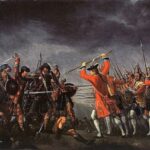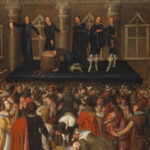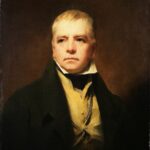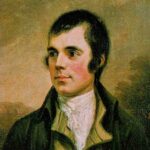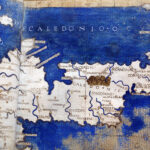Storm Over the Highlands: The Jacobite Rising of 1719
In the spring of 1719, the mists that clung to the Scottish Highlands began to stir again with the sound of foreign boots and ancient songs. There, in the lonely glens of Ross-shire, the last embers of the Stuart cause were fanned once more—not by clan chiefs or Jacobite loyalists alone, but by foreign powers, gambling on Britain’s inner divisions. This was not a mass uprising, nor a war of sweeping invasions. It was, rather, an echo—the Jacobite Rising of 1719, a minor episode in scale, but rich in the same tragedy and defiance that had come to define the cause.
The origin of the rising was neither Scottish nor particularly British. It was Spanish. In 1718, the War of the Quadruple Alliance had erupted in Europe. Spain, frustrated by its losses in Italy and humiliated by the Treaty of Utrecht, sought to destabilize its enemies by supporting rebellions abroad. Scotland, still restless after the failed 1715 Rising, seemed fertile ground. The Spanish government, under Cardinal Alberoni, pledged support to the Jacobites and agreed to fund a two-pronged invasion of Britain.
The plan was wildly ambitious—and fatally flawed. One force, a full-scale armada of 5,000 troops, was to land in southwest England and rally discontented Tories. A second, smaller expedition would sail to the western Highlands, where it was believed the Jacobites could rise again. But as with so many Jacobite plans, the weather proved mightier than the sword. In March 1719, the Spanish fleet was struck by violent storms in the Bay of Biscay and scattered before it could land. Only the Highland expedition, carrying just 300 Spanish regulars, reached Scotland.
The Jacobite forces in Scotland were led by Major General George Keith, a veteran soldier and Jacobite exile, and William Murray, Marquess of Tullibardine, whose family prestige lent the expedition a semblance of legitimacy. The Spanish, under Don Nicolás de Castro, brought muskets, discipline, and money—but not numbers. The Highland clans, disillusioned after the crushing disappointment of 1715, did not rise en masse. Only a handful of northern clans joined the rising, bringing the total Jacobite force to roughly 1,200 men.
With little popular support, the Jacobites fortified Eilean Donan Castle, an ancient stronghold guarding the sea loch of Alsh. But on 10 May 1719, it was bombarded and captured by the Royal Navy. The small garrison was overwhelmed, and much of the gunpowder, supplies, and Spanish arms were seized. Cut off from supply and increasingly isolated, Keith and Tullibardine pressed inland toward Inverness, hoping to spark rebellion in the east.
It was a hopeless gamble. On 10 June 1719, near the small hamlet of Glen Shiel, they were intercepted by government forces under Major General Joseph Wightman. Wightman had roughly 1,000 regulars, supported by local militia and artillery. The Jacobites held the high ground, but Wightman’s guns—deployed with uncharacteristic efficiency—forced them from their rocky slopes. The Highlanders charged, but were repulsed. The Spanish, despite fighting bravely, were outmaneuvered and cut down. Within three hours, the battle was over.
“The rising collapsed,” writes historian Daniel Szechi, “with neither triumph nor martyrdom—only rain, smoke, and the moans of the wounded in the heather” (Jacobitism and Tory Politics, 1984, p. 191). The Spanish troops surrendered with honor and were later repatriated. The Jacobite leaders, including Keith and Tullibardine, escaped into the mountains and fled into exile.
Politically, the rising changed little. Britain’s government, wary of turning soldiers into saints, chose not to pursue mass executions. Spain quickly lost interest, having made its point and tired of its proxies. The rising was, in the words of historian Bruce Lenman, “a brief continental flirtation with rebellion, betrayed by overconfidence and abandoned by fortune” (The Jacobite Risings in Britain, 1980, p. 141).
Yet symbolically, the 1719 Rising revealed how enduring the Jacobite dream had become—and how persistent the illusion that foreign powers might restore a dynasty whose time had passed. It might have written: “It was the kind of war that men begin with trumpets in foreign courts, and end with hoofbeats in the mud—remembered not for what it did, but for what it tried to do.”
References:
- Lenman, Bruce. The Jacobite Risings in Britain, 1689–1746. Eyre Methuen, 1980.
- Szechi, Daniel. Jacobitism and Tory Politics, 1710–14. Edinburgh University Press, 1984.
- McLynn, Frank. The Jacobites. Routledge, 1998.
- Prebble, John. Culloden. Penguin, 1961.
- Pittock, Murray. The Myth of the Jacobite Clans. Edinburgh University Press, 1995.

